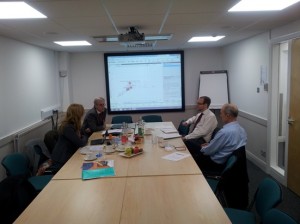How does the Swedish approach to monitoring efficiency and effectiveness in higher education differ from the UK? Andrea Amft, Max Kesselberg and Anders Viberg of the Swedish Higher Education Authority reflect on their visit to Universities UK and HESA.
In order to study the ways in which the United Kingdom works with efficiency in its higher education system, three representatives from Universitetskanslersämbetet (Swedish Higher Education Authority, SHEA) attended the Universities UK conference ‘Working for a smarter, stronger sector’ in March 2014. We were generously invited to discuss the issues around monitoring and measuring efficiency with representatives from Universities UK in London and also with HESA on our visit to Cheltenham.
In this short article we would like to describe the way in which the SHEA has chosen to monitor the efficiency and effectiveness of higher education in Sweden, highlighting some important differences between our countries.
In Sweden the higher education sector is governed by laws and statutes and the Swedish Higher Education Act states that the operations of higher education institutions shall be arranged to ensure that high standards are attained in courses and study programmes and in research and that the resources available shall be used effectively to sustain a high standard of operation.
In 2011 Riksrevisionen (Swedish National Audit Office) presented a report entitled Använder lärosätena sina resurser effektivt? [Do the HEIs make efficient use of their resources?]. As a result the Government assigned the SHEA the task of monitoring the efficiency and effectiveness of the operations of the HEIs.
In Sweden the higher education sector is in a fortunate position as, unlike the United Kingdom, the Government has not made any cuts or announced its intention to reduce funding for education and research in the future, but what matters is the attainment of good results with existing resources. The sector therefore concentrates mainly on attainment of its targets.
Reliable factual information is needed to monitor efficiency and effectiveness and as the higher education sector in Sweden receives 85 per cent of its funding from the state, HEIs are required to provide the SHEA with data. The Ordinance on Annual Accounts and Budget Figures stipulates that HEIs must account for and comment on the results of their operations in relation to the tasks assigned in the SHEA’s instructions and, when applicable, laid down in its public service document or any other decision. In accounting for results the main focus is to be on development of the HEIs’ operations in terms of volumes and costs.
This data is publicly available and published in a statistical database (NU-database) on the web. It is in Swedish only and includes data on courses and programmes, staffing, funding, premises, etc. The SHEA also publishes an annual report ‘Higher education in Sweden 2013’ (abridged English version). The fact that the HEIs are officially required to present these statistics guarantees both uniformity and high quality.
After studying other countries, discussing problems with the sector and also internally, we came to the conclusion that a bottom-up principle in which the HEIs could compare themselves with each other would best serve to improve effectiveness and efficiency.
For this reason we acquired Statistics eXplorer software, a tool that enables both analysis and visualisation of data from the SHEA as well as data from the sector itself. The web page offers a “story” visualised with dynamic diagrams as well as the full version of HEI-eXplorer. This approach has received positive feedback from the sector and already given rise to discussions about effectiveness and efficiency at the HEIs. We have also arranged a training course for the HEIs on how the software can be used. This was fully subscribed after two days.
Here we are demonstrating the web-based tool HEI-eXplorer chosen by the SHEA to enable HEIs to compare themselves with each other to Jamie Arrowsmith and Ian Powling of Universities UK. Anders Viberg behind the camera.
We became aware of the pressure that the HE sector in the UK is subject to and that further cuts can be expected. We were impressed by the energy and determination with which Universities UK and the HE sector is undertaking the work of increasing efficiency. One watchword is benchmarking and we formed the impression that the work of HESA is important. HESA offers not only a considerable amount of data and key performance indicators but also outstanding search and presentation possibilities. This latter area is one in which Sweden needs to improve, as we came to realise during our visit.
Andrea Amft Ph. D, Max Kesselberg Ph. D and Anders Viberg Ph. Lic, SHEA








